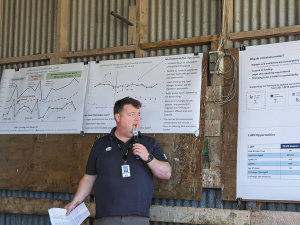Fonterra slashes forecast milk price, again
Fonterra has slashed another 50c off its milk price forecast as global milk flows shows no sign of easing.
 Sean Spence, Farm Source sustainable dairy adviser for North and Central Canterbury, speaks at the recent LUDF Focus Day.
Sean Spence, Farm Source sustainable dairy adviser for North and Central Canterbury, speaks at the recent LUDF Focus Day.
Fonterra will help farmers meet greenhouse gas emission reduction targets by supporting efficiency gains on-farm, says Farm Source sustainable dairy adviser for North and Central Canterbury, Sean Spence.
Spence was a speaker at a recent Lincoln University Demonstration Dairy Farm (LUDF) Focus Day, where he expanded on Fonterra's Climate Roadmap which was publicly announced last November.
Fonterra has only recently joined SIDDC (South Island Dairy Demonstration Centre), the industry and academia partnership that runs the LUDF, and took a major role in its first farm focus day as a partner.
Spence said Fonterra believes New Zealand milk is the most valuable milk in the world due to our grass-fed farming model, which gives it a carbon footprint one third the global average, but it was important to understand why Fonterra had now set GHG targets.
There were four key drivers, one being access to market and customers.
"The customers we sell to now have emissions targets and are looking within their supply chain as to how they meet those targets."
Spence said Fonterra customers including the likes of Nestle, Mars, Starbucks and Unilever have all set various ambitious reduction targets that they intend to meet in the near future.
"Fifty percent by 2030 and net zero by 2050 is reasonably common and our customers are moving quickly."
Second was access to future funding. Debt capital partners were linking sustainability credentials to loans, and that was already playing out at both farm and co-op level, with interest rate reductions being linked to sustainability initiatives.
Meanwhile, Fonterra is one of around 200 businesses in New Zealand that will soon have to report on climate risk targets and progress towards those targets, under the Financial Markets Act.
Fourthly was Fonterra's aspiration to be a leader of long-term sustainability - which was about building resilience in the business, he said.
"We'll focus on climate, water, and animal wellbeing. Those are three areas where we believe we can lead and create that competitive advantage."
Fonterra had announced the Climate Roadmap at its November 2023 AGM, targeting a 30% intensity reduction in on-farm emissions by 2030 (from a 2018 baseline).
This would be achieved through a numbers of ways:
"This target is collective across all milk supply to the co-op. So we need individual action to achieve a collective result," said Spence.
"We don't really see our role as telling farmers where to fous but more of what are some of the opportunities unique to their farm?"
Under the 7% to be achieved through farming best practise, Spence said that can be organised into three key focus areas: animal efficiency around nutrition, genetics, reproduction and health; nutrient optimisation through feed type and quality, and nitrogen and ethanol management; and 'other' emissions, being imported CO2 from feed, fuel and fertiliser.
Mating wrapped up last month at the across-breed Beef Progeny Test on Pāmu’s Kepler Farm in Manapouri.
Libby Judson is a keeper of memories from an age gone by. Tim Fulton tells her story.
A New Zealand-first native tree study has highlighted the Bioeconomy Science Institute's position as a forestry research leader.
Hemp fibre processor Rubisco is relocating its core processing facility to Ashburton as part of a $20-$30 million expansion to leverage what it says is an accelerating global demand for sustainable and renewable fibres.
Tradition meets some of the latest in technology at the 2026 East Coast Farming Expo.
OPINION: Trade Minister Todd McClay and the trade negotiator in government have presented Kiwis with an amazing gift for 2026 - a long awaited and critical free trade deal with India.